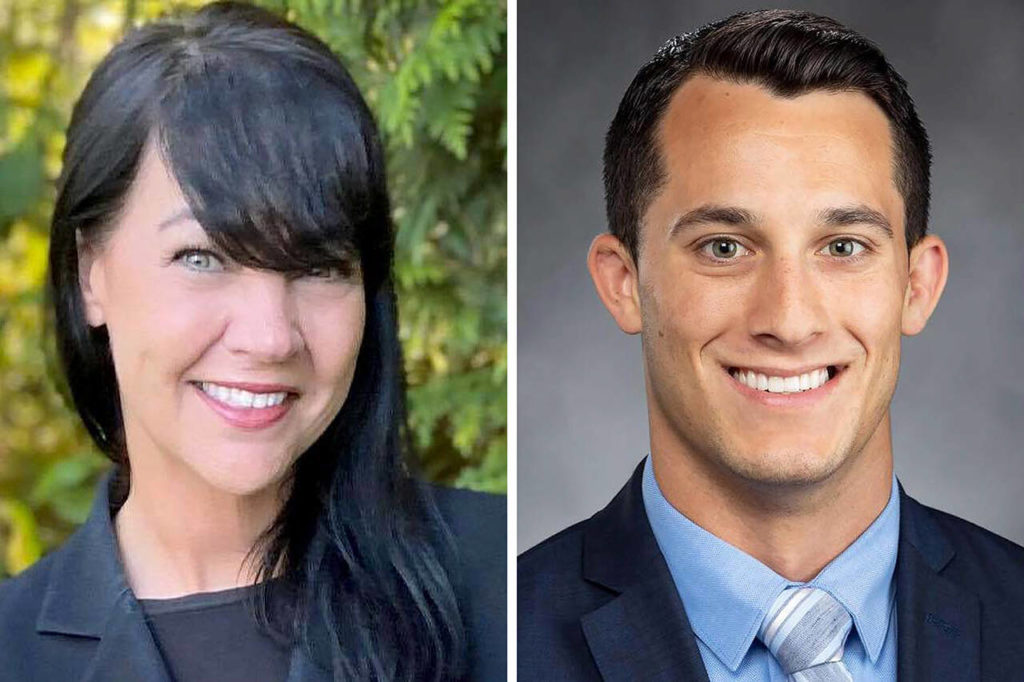By The Herald Editorial Board
Three of the five seats on the Snohomish County Council — Districts 1, 4 and 5 — are up for election in the Nov. 2 general election.
District 1
District 1 of the Snohomish County Council represents residents of Arlington, Darrington, Granite Falls, Marysville, Lakewood, Stanwood and unincorporated north Snohomish County.
Prior to the August primary election, the editorial board endorsed the reelection of County Council member Nate Nehring. Joining Nehring, an Arlington Republican, on the general election ballot is Nicole Ng-A-Qui of Lakewood, a Democrat.
Ng-A-Qui’s campaign did not respond to a request for an interview prior to the primary election, but was recently interviewed to provide a brief candidate profile.
Ng-A-Qui has run a small business for 18 years and is making her first run for public office. The Lakewood resident earned a bachelor’s degree in natural resources management from Colorado State University, with an restoration ecology certificate from the University of Washington. She has worked for 25 years as an arborist for city and county governments. She has served on a policy advisory council for an early childhood education and assistance program and has coached youth basketball.
Ng-A-Qui said she believes the county can do more to work with developers to provide a greater stock of housing while protecting the environment and taking action on climate change. Development needs to be steered away from critical areas to prevent tragedies such as the Oso landslide, she said. Drawing on her arborist background she said she’d like to see the county’s tree canopy ordinance strengthened to better address both environmental and climate concerns.
Ng-A-Qui said she would work for sustainable resource management and development, support of small business, housing affordability and public safety that emphasizes treatment efforts for drug addiction over jail time. Recognizing Nehring’s commitment to bipartisan action on the council, Ng-A-Qui said she counts several Republicans as friends and colleagues and would be able to work with all residents in the district.
Nehring was appointed to the council to fill a vacancy in 2017, then won election to his first term that fall. The editorial board’s July endorsement noted among Nehring’s accomplishments his leadership regarding trades education and apprenticeships. Nehring was key to the effort to create the Regional Apprenticeship Pathways program, which seeks to guide high school students into training and jobs in construction and similar trades. The effort brought together local officials, school districts and representatives of labor and industry.
Nehring also stands out for his commitment to a working relationship with the rest of the council, including its three Democrats. He has worked particularly closely with council member Jared Mead, a Democrat, in that regard. Nehring and Mead wrote a commentary together in January, published in The Herald, that spoke to the importance of working together on issues at all levels of government.
District 4
The council’s 4th District includes the cities of Mill Creek, Mountlake Terrace, Brier and Snohomish County’s Bothell neighborhoods.
Jared Mead, a Democrat, was appointed to the council in 2020 to fill a vacancy and won election that fall to complete the year remaining; he is now running for a full four-year term. He is challenged by Republican Brenda Carrington, who ran against Mead in 2020.
Carrington, a county resident for 11 years, owns and operates a design and construction business for landscape and interior design. Carrington did not respond to requests to participate in a joint interview with Mead.
Mead, who served a full two-year term in the state House in the 44th Legislative District prior to his appointment, also served on the Mill Creek City Council and on the city’s planning commission. His past employment was in finance.
Mead started with the council just as the pandemic hit, providing a challenge in his first months to build relationships and meet with constituents. Among the most pressing issues for the county, Mead said during an interview, are land use, housing and the environment. With prospects for some 250,000 more county residents in the next 20 years, the county will need to focus on how best to use zoning and a comprehensive plan update to guide that growth, he said.
In addition, the county and its cities face a growing problem with homelessness, poverty, limited mental health services, and an opioid addiction crisis that has only grown during the covid pandemic.
What is holding the county back in addressing those and other issues, Mead said — and it’s been noticed unfavorably by state lawmakers he recently worked with — is the reduction in revenue that the county has caused itself by declining to take the allowed 1 percent property tax increase for the last eight years and not moving to make a modest increase to the county’s share of the sales tax — one-tenth of 1 percent — as allowed by a two-year-old state law to fund affordable housing efforts.
That revenue is needed to begin making needed investments, Mead said.
Among the notable relationships Mead has developed while on the council is his work with Nehring. While they rarely agree on policy and often vote opposite of the other, Mead said he and Nehring share much in common as young fathers and the husbands of teachers. Both also were distressed by the events of Jan. 6 in Washington, D.C., during the U.S. Capitol riots and jointly wrote a commentary for The Herald that called for a common path to worked past incivility and personal attacks at all levels of government.
The commentary wasn’t viewed favorably by the parties of either, but was praised by others, including schools and service clubs that asked the pair to speak. So far, Mead and Nehring have appeared together more than 20 times, mostly at high schools’ current events classes.
The county council, for the most part, has offered a refreshing example of what bipartisanship actually means: not necessarily agreement on issues, but a commitment to work to recognize the other’s good faith to represent and serve constituents. Mead, like Nehring, should be retained on the council to continue that commitment.
District 5
The 5th District roughly encompasses the county east of Highway 9 and south of and including Lake Stevens and the communities of Snohomish, Monroe, Sultan, Gold Bar and Index.
Republican Sam Low has served on the council since winning election in 2016 to complete an unexpired term, then winning election to a full term in 2017.
Low is challenged by Democrat Brandy Donaghy.
Low, a former school teacher, has been a small business owner for 10 years. For the council, he serves as chairman of its public works committee, the state Transportation Improvement Board, the state Traffic Safety Commission and past chairman of the county health district board. Before his time on the council, Low served on the Lake Stevens City Council and the Puget Sound Regional Council’s executive committee.
Donaghy, a U.S. Navy veteran, has previously worked as a real estate agent and has completed a bachelor’s degree in business administration and management information systems. She has served on a Community Emergency Response Team, is a disaster preparedness trainer and an art docent with Everett Public Schools. She also serves on the board of the Communities of Color Coalition.
Donaghy told the editorial board see hoped to focus on improving the county’s preparedness and resiliency to head off the losses and costs that come with responding to a crisis.
Low has taken a leadership role on the council on transportation issues, noting past and ongoing work on the county’s major arterials, specifically, the U.S. 2 trestle, Highway 9 and Highway 522, to secure state funding for design work that should lead to construction funds in an upcoming transportation budget.
Donaghy called for addressing traffic congestion from a different angle, finding ways to get cars off the roads and using existing infrastructure to move people and goods.
On housing issues, Low has worked to streamline the county’s approval process for accessory dwelling units in urban growth areas, providing an affordable option for young families looking for a starter home or older couples looking to downsize.
Donaghy’s work in real estate has provided background regarding issues of affordable housing and the housing market in general. More housing market-rate housing construction is on its way, she said, and she supports the county’s move to streamline the process for accessory dwelling units in single-family neighborhoods, but said it’s also necessary to approach housing affordability by aiding wage growth among county families.
On budget and tax issues, Donaghy said she’s not a fan of regressive taxes, such as the sales tax, but would consider new revenue sources, noting that, as seen with crises over homelessness, opioids and mental health, it’s more expensive to respond after the fact than to prevent problems.
Low, rather than tax increases, said he prefers to look for efficiencies, making changes to programs and facilities that can save money. Low pointed to the county courthouse remodel that, while winning acceptance from county judges, saved the county about $100 million rather than building a new courthouse.
Donaghy presents an informed and thoughtful challenge to Low, but Low, because of his background and working relationships with other officials on the county’s transportation needs; his recent work with other county officials to encourage broadband investments in the county; his efforts to aid small businesses during the pandemic; and a collaborative approach with the rest of the council and the county executive warrants reelection to the council.
Correction: An earlier version of this editorial misstated the length of term for Jared Mead’s time as a state legislator. He served a full two-year term.
Talk to us
> Give us your news tips.
> Send us a letter to the editor.
> More Herald contact information.


























